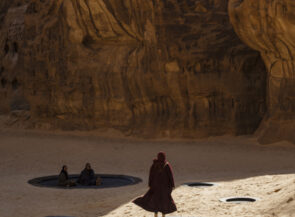The Emmy Award-winning TV host continues to share stories we can all relate to on her show, Tamron Hall
When Tamron Hall was pitching a daytime talk show to networks after leaving Today in 2017, she drew on the fact that she was a lot of things to a lot of people. “I, at one point in time, was on seven different shows on five different networks, and each show was very different,” says Hall. “As I would travel, I recognized that people knew me from different shows: I’m in Texas, and they might have known me for Deadline: Crime. I’m in New York, and they may have seen me on MSNBC. I’m in Arizona, and they would know me from the Today show.” It turned out she appealed to everyone, everywhere, and consequently the syndicated show Tamron Hall, which launched in 2019, was an immediate success, earning its star and executive producer a 2020 Daytime Emmy Award for Outstanding Informative Talk Show Host.
Hall won the award again in 2022, and the show, now in its fourth season, is doing better than ever, breaking ratings records and booking guests such as Michelle Obama. Unlike daytime shows that lean into variety territory, Hall considers her program “a daily conversation,” which she believes is a big reason that it’s connecting with audiences: “I say it’s brunch with friends, two mimosas in. We can laugh together, cry together, learn together, and feel less alone together. That’s the goal.”
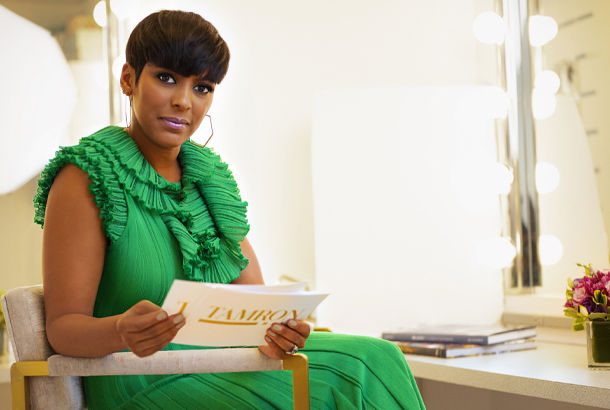
You kicked off this year with a new theme for your show: 2023 is “2020-Me.” Tell me about that.
We’re embracing the positive nature of focusing on one’s self and not feeling selfish. As a mom, I understand that. As a daughter, I understand that. As a woman, I understand that. As people, we’re trained to believe that if you say “me,” you are selfish, but we are really embracing the mentality of 2020-Me, and that’s OK.
How are you doing that personally?
For me, 2023/2020-Me means carving out time for the things I really love and enjoy outside of motherhood, outside of the validation of work. That, for me, is cooking. [Cooking] has been a big component of our show because I believe it is one of those common threads that brings us together. But also, as I said, it’s something that I selfishly enjoy. [Laughs.] And I’m not using the word selfish! It’s about embracing the things that make you happy and not feeling selfish about it.
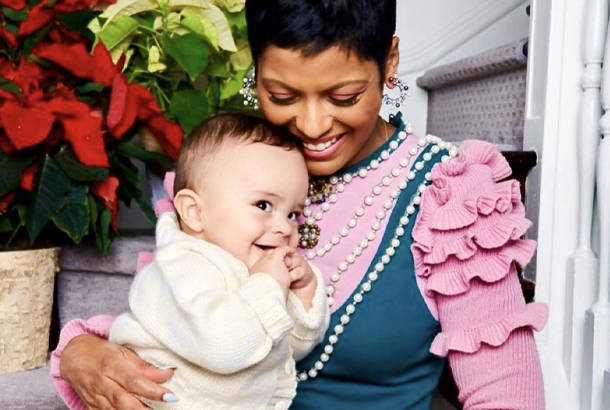
You mentioned motherhood. You had your son in 2019, the same year you launched your show. How did becoming a mother change you?
I often, in the show, make the point that I don’t equate womanhood with motherhood. I’m a woman for 53 years; I’ve been a mother for three years, and those are different layers to who I am. My son has opened my eyes to truly understanding what it takes to grow someone—teaching them empathy.
I would never have known this process. I thought, OK, you just learn to feel compassion. You just learn joy. While those things are natural to some degree, I underestimated in many ways, until I became a mom, what just caring and loving on a teddy bear teaches a child. I now appreciate and understand firsthand the great and awesome responsibility of raising a child, and that’s why so often we have topical shows regarding mental health and kids.
I like to think that we all have our own superpowers, and I feel as if you have this real power to see people and to make them feel seen. I was watching recent episodes with the actor J. Alphonse Nicholson and the TV personality Coco Austin, and how overcome they were when someone told them that they were good—that they were good enough. That was so powerful.
Yeah, it is, and it’s surprising when you have someone like a Coco Austin, who on social media embodies confidence, right? This modern version of confidence, this social media confidence. But having her husband, Ice-T, say, “You are a great mom,” and hearing that applause from the audience sent her into tears. But those tears were from someone who needed that, and that’s why that show did so well. We all need that: You’re good enough. You’re OK. And you can’t get that from social media. Sure, we can go through the comments and read, and there are people who say, “Oh, I love this. Great job.” But there’s nothing like a loved one or being in person and having someone say to you, “You’re doing great.”
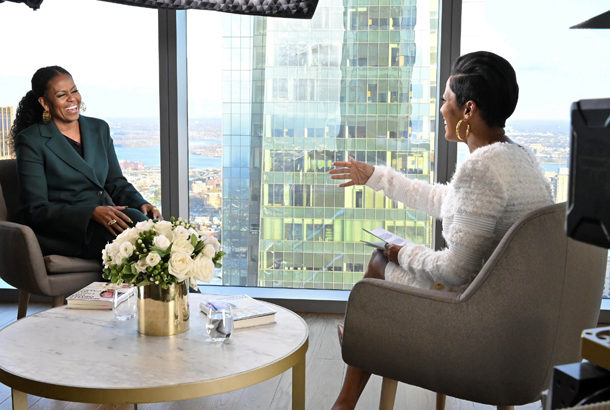
Yeah, I was definitely crying.
Me too! I mean, listen, I lost it. I lost it twice. And by the way, [even after] 30 years of journalism, I love this show because there are moments like that, where even I am surprised. It was the best of what we bring out of a celebrity interview. We are a mix of celebrity and what people call human interest. That’s one of those industry terms, but I just say people. We talk to people, whether they live their lives in the spotlight or not. Those are the types of celebrity interviews [that have impact], like Michelle Obama recently, and her openness with us. There was a line where she said, “I’m a Black woman,” and there was a hardiness to it. Of course we know—her husband was the first Black president, and she’s the first Black first lady—but hearing how she felt not good enough so many days? Those are the types of celebrity interviews I believe inspire people. That’s been one of our rules from day one: If you want to come on and just plug your book or plug your movie, we’re not the place for you. If you want to come on and talk, come on. And that doesn’t mean I’m unpacking trauma. That just means talk to the Tam Fam as you would your friend. We’re all friends on this show.
So who in your life does that for you—helps you feel seen and that you’re good enough?
That’s a great question. Wow. No one’s ever asked me that. I believe my mom has always done that for me. Certainly, she has been the weather vane of my life: She’s right at the top, pointing me in the right direction. As a mother, recently I was having that moment where I felt I was not giving my son the time—and this is a moment I actually get a little emotional speaking of. I know every parent understands that moment, when you feel that you’re being pulled in a million different directions, and I just realized I hadn’t sat down and had a meal with my child that entire week. And my mother said to me, “You’re a great mom,” and I, much like Coco, just lost it.
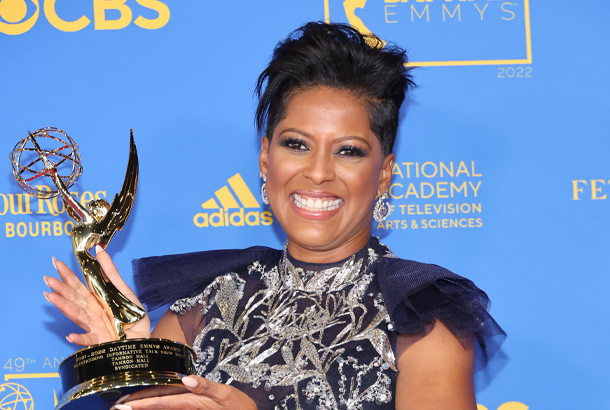
You’ve talked about how, early on, execs or advertisers wanted to peg your show as a “Black” program and thought you should just have Black guests. Obviously, it’s much more diverse than that, but at the same time, do you feel the need to have more Black guests because their voices and stories aren’t being amplified elsewhere?
Absolutely. My friend [the late] Michael K. Williams made an appearance on the show, and he was promoting his latest project, and then we started to talk about his battle with substance abuse and his journey. A couple of months later I was in Brooklyn, headed to a restaurant. I had a mask on, actually, and he said, “I’d know those eyes anywhere.” And I said, “Oh, Michael!” We hugged—we were in front of the apartment building, actually, where he was found [dead]—and he said, “Thank you. Thank you for having me on. You have no idea how hard it is for my team to get me booked on shows like yours.”
Oh, wow.
And I said, “Like mine?” He said, “Daytime shows where people talk.” “What? Are you kidding me? Michael K. Williams, the guy that everyone loves from The Wire, from this, from this, from that. Are you kidding me?” He said, “No.” And we both knew why: Because there are people who would say, “He’s not morning show; he’s not daytime. Put him on in the evening or put him on a cable show.” But he felt the need to share that with me, and so that’s why I am very mindful that in this wide swath of TV there are people, even like Michael K. Williams, who aren’t invited to the table, or who are brought on for one-dimensional reasons—the drama or the clapback versus the story. A Michael K. Williams should be able to tell his story on daytime TV and laugh, and cry, and be great.
I know that when you were growing up in Luling, Texas, seeing Dallas’s first Black news anchor, Iola Johnson, was incredibly inspiring to you. How does it feel now that you’re providing similar inspiration for young women?
It blows my mind. It really does. I grew up wanting to be Johnny Carson, and then at some point making the quick pivot to wanting to be Iola Johnson. No one has ever, I bet, put those two in a category, but here I am! Then there was Arsenio Hall—who was a dream guest. He was on my list of people I always wanted to talk with, because of what he did for late night television. [When he was a guest on my show] I said, “Well, I’m kind of the love child of Arsenio and Oprah,” and he just burst into laughter.
Do you think growing up in a small town made you more attuned to people’s stories?
Absolutely. It is why I say, “Everyone has a story. Let’s talk about it.” Everyone has a story. I know that it’s easy to be pulled into the greatness of a Tyler Perry and wonder what his story is. Or the greatness of the authors from our Let’s Get Lit! Book Club, who wrote a book and suddenly they’re a New York Times best-seller—it’s easy to wonder about their lives. It’s when you are able to be curious about Louis Mitchell Sr., born in 1901, a sharecropper who became a barbecue guy at the back of a grocery store and then took home this kid named Tamron Hall and helped her believe in herself. Those are the stories. That’s kind of what I got from growing up [where I did]: recognizing the best stories aren’t always the ones from people who are famous or wealthy.
Now you’re creating your own stories, by writing murder mysteries. I started reading your first book, As the Wicked Watch, last night, and it’s so good. How in the world did you find the time to do this?
The book had simmered in my heart for many, many years. I covered a story [of a young girl’s murder] in Chicago when I first started out as a local reporter that always haunted me. It was one of those moments where I recognized what type of journalist I would need to be, versus what was expected of me. There was another story in Dallas–Fort Worth that I covered that same year, where another 12-year-old girl was the victim of a murder, and both of their stories just stayed with me. And then the pandemic happened. Like everyone else, you garden, you do a DIY, you do some things around the house to distract you from what was happening, and I started to write. I would get up at 4 in the morning, have a cup of coffee, wait for my son to wake up at 5, 5:30, and I would start writing. [The protagonist is] Jordan Manning, named after Michael Jordan and Peyton Manning—I clearly had insomnia, and the TV was stuck on ESPN or something that night. [Laughs.] Before I knew it, the novel was done, and I, by then, was bitten by the bug, and I have just finished my second in the series.
Congrats! You also announced in November that the first book has been optioned to be adapted for TV. Spill the tea: Who will play Jordan?
Here’s the scoop: It won’t be me. That’s all I can tell you. I won’t play Jordan Manning!

